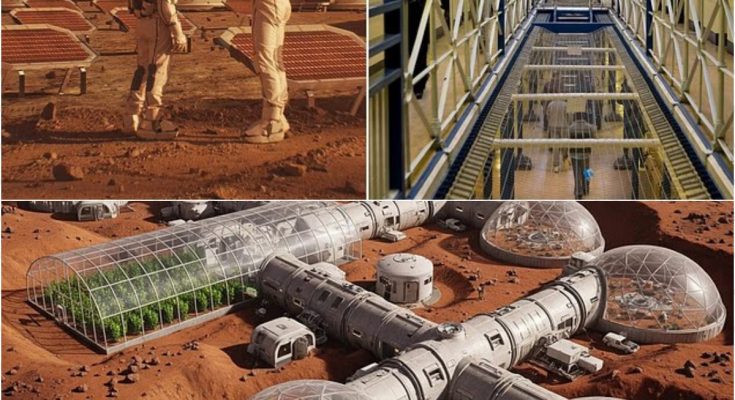Imagine stepping onto the rust-colored surface of Mars, 140 million miles from Earth, ready to carve out humanity’s future among the stars. The dream of colonizing the Red Planet has fueled science fiction and space exploration for decades. Yet, a leading space scientist warns that life on Mars may feel less like a heroic adventure and more like serving a sentence in one of Earth’s most oppressive prisons.

Professor Lucy Berthoud, a space systems engineer at the University of Bristol, draws a chilling parallel between the lives of Martian colonists and inmates locked in cells. Far from the spacious, futuristic “oases” promised by space agencies, astronauts on Mars could face cramped quarters, rigid schedules, bland food, and crushing isolation—conditions eerily similar to those in a high-security prison. Here’s why the Red Planet might trade one kind of confinement for another.
Trapped in Tight Spaces: No Room to Breathe
On Mars, resources will be scarce, and survival will be the top priority. Just like overcrowded prisons, where the European standard of four square meters per inmate is often violated, Martian habitats are likely to be equally cramped. For context, NASA’s Apollo Command Module, which carried three astronauts to lunar orbit, squeezed them into just 6.2 cubic meters of space. Imagine living, working, and sleeping in a space smaller than a walk-in closet, surrounded by the same small group of people for months or even years.

This lack of personal space breeds tension. In prisons, close proximity heightens stress and sparks conflicts. On Mars, where escape is impossible, the psychological strain of constant togetherness could push even the most resilient astronauts to their breaking points. Professor Berthoud explains, “Too little personal space and privacy, overcrowding, and a lack of variation in daily activities create a pressure cooker environment.”
A Life of Constant Danger
Both prisons and Martian colonies are high-risk environments, though the threats differ. In prisons, inmates face physical dangers from conflicts or neglect. On Mars, astronauts will contend with cosmic radiation, equipment failures, and the ever-present risk of a habitat breach in an atmosphere too thin to breathe. This persistent danger keeps the body’s stress response on high alert, taking a toll on mental and physical health.

“Astronauts are specially trained to handle emergencies, unlike prisoners,” says Professor Berthoud. “But over a long mission, living in a high-risk environment wears you down.” The constant threat of catastrophe, combined with the inability to step outside for fresh air, mirrors the unrelenting stress of incarceration.
A Schedule That Feels Like a Sentence
Life on Mars will be governed by a rigid routine, much like a prisoner’s tightly controlled day. On the International Space Station (ISS), astronauts endure grueling 15-hour workdays, with eight hours of work, two hours of mandatory exercise, and just one precious hour of personal time. Martian colonists can expect a similar lack of autonomy, with mission control dictating every moment of their lives.

This loss of control can erode mental health. In prisons, rigid schedules strip inmates of agency, fostering resentment and rebellion. Professor Berthoud warns that astronauts, despite their training, may chafe against NASA’s strict guidelines, potentially leading to defiance or breakdowns over time. The lack of freedom to choose when to eat, sleep, or relax could make the Red Planet feel like a cosmic cellblock.
Food: A Bland Reminder of Earth
Food, a cornerstone of human comfort, will be another challenge. In UK prisons, inmates are allocated just £2.70 per day for meals, resulting in low-quality, unappetizing food. While Martian colonists will likely have more expensive fare, the lack of fresh ingredients will limit variety. On the ISS, NASA invests heavily in making space food palatable, yet astronauts often lose their appetite and struggle to maintain their weight.

On Mars, where resupply missions could be years apart, colonists will rely on processed, shelf-stable meals. The monotony of eating the same limited menu, far from Earth’s vibrant flavors, will echo the dreary dining experience of prisoners. This culinary confinement could sap morale, making every meal a reminder of how far they are from home.
Isolation: The Deepest Cut
Perhaps the most striking similarity between life on Mars and in prison is the profound isolation. Prisoners are cut off from friends, family, and society, with limited contact through letters or brief calls. Martian colonists, stranded 225 million kilometers from Earth, will face an even deeper sense of disconnection. Even in the best-case scenario, a message to loved ones takes up to 24 minutes to travel one way, and a return trip to Earth could take six months or more.

“The effects of isolation will be similar, but on Mars, the remoteness from everyone you care about adds another layer,” Professor Berthoud notes. This extreme separation could lead to depression, anxiety, or other mental health challenges, even for astronauts who willingly signed up for the mission. Like prisoners, they’ll be trapped—not by bars, but by the vastness of space.
A Better Way Forward: Lessons from Mars to Earth
While the parallels to prison life are stark, Professor Berthoud doesn’t suggest that Mars colonies should emulate correctional facilities. Instead, she advocates for the opposite: designing Martian habitats to maximize privacy, autonomy, and purpose. Spacious living quarters, flexible schedules, and meaningful tasks could help astronauts thrive in their extraterrestrial home. These principles could even inspire reforms in Earth’s prisons, creating environments that prioritize rehabilitation over punishment.

“I’d suggest rethinking prisons to be more like the ideal space base,” says Professor Berthoud. “More space, more autonomy, and a sense of purpose would help anyone cope with stress, whether they’re on Mars or in a cell.”
The Martian Dream: Freedom or Confinement?
The journey to Mars is sold as humanity’s greatest leap, a chance to break free from Earth’s bounds and build a new world. Yet, the reality may be far less glamorous. Cramped, dangerous, and isolating, life on the Red Planet could feel like a voluntary exile to a high-tech prison. As we prepare to send humans to Mars, we must confront these challenges head-on, ensuring that the pioneers of tomorrow aren’t sentenced to a life of confinement in the name of exploration.



